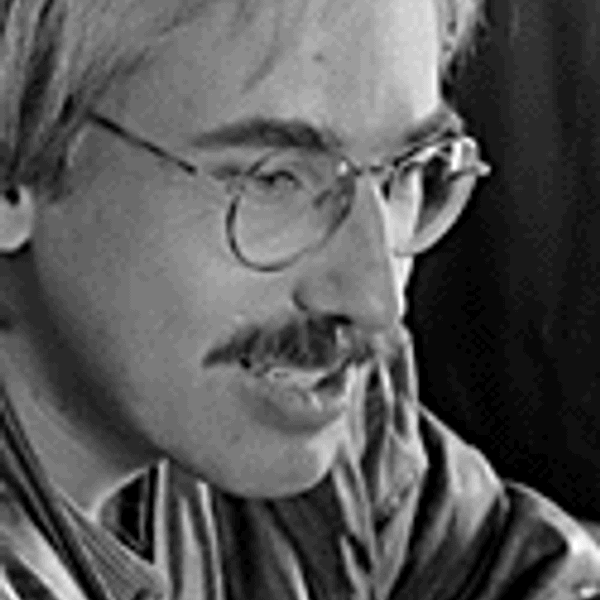Lia Purpura, Skate’s Egg Case (detail), featured in AGNI 102
Into a World of Light: Lucie Brock-Broido, 1956–2018
a eulogy delivered at Story Chapel, Mt. Auburn Cemetery, March 12, 2018
I’m heading for the kiosk in Harvard Square after an editorial huddle with the Chinese-born writer Ha Jin when Lucie Brock-Broido comes clicking out of the Paradiso (the city’s brimming with poets) and says she’s just received the galleys for her first book, so I follow her back to the little round glass table and drink black coffee while feeding on the poems in A Hunger.
The first time I saw Lucie, at a poetry reading, she was wearing a skin-tight red leather jumpsuit. She looked like a flamboyant Catwoman or a blond Emma Peel. Her appearance signaled the arrival of a different kind of presence on the buttoned-down Boston literary scene. Even half-peeled, her suit hid more than it revealed. You didn’t need to talk to Lucie very long before you recognized a true original, artfully defended, who dressed like she was waiting for Christopher Marlowe to swing by on his Harley. Her poetry glinted with likeminded force.
“We are of imagination all compacted,” wrote that other visionary poet William Blake. And no one knew better the stuff that we and dreams are made on than Lucie, who was one of the only people I know able to bend the space-time continuum to her will. In Lucie’s company, time disappeared. The spaces she inhabited she dreamed into existence. Gothic arches, gargoyles, even thrones began materializing in multiples on Sargeant Street in Cambridge. Lucie’s oncologist made house calls, driving hours from New York to see her. The only other beings I’ve met endowed with this capacity have been Tibetan lamas.
The last time I saw Lucie was at the Star Market in Porter Square. She had called me a few weeks earlier to say she had a brain tumor and was dying. She said it in the same way as she had said many things over the last thirty-plus years, with characteristic theatricality. Lucie appeared so elaborately shuttered you might not realize her heart was always wide open. During dark nights of the soul there was no better company. She’d been there, and arrived equipped with a miner’s headlamp. At first I thought she was kidding. Lucie was famously a connoisseur of the inappropriate remark. I didn’t put it past her. But she wasn’t. That night I texted her to say I wanted to drop by. Receiving no answer, I called, but her mailbox was full. Frustrated, I went shopping, instead, at the supermarket near where we all lived in Cambridge in the eighties, before the end of rent control. I headed for the soda aisle. And there was Lucie, eyeing paper towels. She was for some reason lately obsessed with Bounty. We hugged. I rested my head on her shoulder and did not want to leave. The decades tumbled together. She was, for me, the early days of literary life: frenzies at the copy center, clutching black binders brimming with drafts; Lucie and Marie at Stanley’s eightieth; Lucie and Bruce partying with Lucie’s mother in Somerville; Lucie with Susan Dodd and Jill McCorkle at Bennington; Lucie, Liam, Tree, and Alex at Bouley Bakery in New York. “Sorry I didn’t answer the phone,” Lucie said, calling me back to the moment. “I’m feeling a little dizzy,” she explained. I nodded. We said our _love you–love you_s and she went off to meet Eileen. I watched her walk, a little unsteadily, down the aisle.

Askold Melnyczuk
Askold Melnyczuk—the founding editor of AGNI, for which he received the PEN/Nora Magid Award for Magazine Editing—is the author of four novels and a book of stories. What Is Told (Faber, 1994), was the first commercially published work of fiction in English to highlight the Ukrainian refugee experience and was named a New York Times Notable. Other novels have been selected as a Los Angeles Times Best Book of the Year and an Editor’s Choice by the American Library Association’s Booklist. His most recent book is a collection of stories, The Man Who Would Not Bow. His selected poems, The Venus of Odesa, is forthcoming from Mad Hat in summer 2025. A book of selected nonfiction, With Madonna in Kyiv: Why Literature Still Matters (More than Ever), will be published by Harvard University Press in 2026. He has edited a book of essays on the St. Lucian Nobel Prize–winning poet Derek Walcott and is coeditor of From Three Worlds, an anthology of Ukrainian writers from the 1980s generation. He’s the recipient of a Lila Wallace-Reader’s Digest Writers Award for fiction, the Heldt Prize for translation, and the George Garret Award from AWP for his work in the literary community. Individual poems, stories, essays, and translations have appeared in The New Yorker, The Paris Review, The Gettysburg Review, The Missouri Review, and elsewhere. Also the founder of Arrowsmith Press, he has taught at Boston University, Harvard, and Bennington College and currently teaches at the University of Massachusetts Boston. (updated 5/2025)
